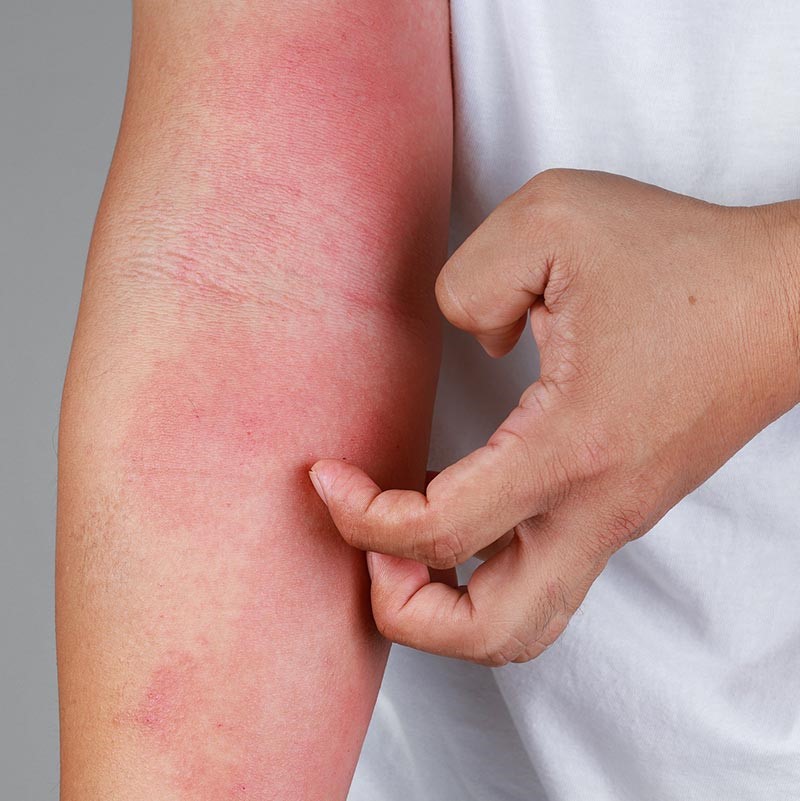We provide comprehensive dermatologic services. You can rest assured you will receive the highest quality care from our board-certified dermatologists.
Eczema is a common skin condition that affects more than 15 million Americans. Babies are often prone to eczema. However, nearly half outgrow the condition or have notable improvement when they get older.

Eczema is a frustrating skin condition! If you have eczema, you no doubt want to find a treatment that works. At St. Louis Dermatology & Cosmetic Surgery, we provide comprehensive dermatologic services. You can rest assured you will receive the highest quality care from our board-certified dermatologists. Call us today to schedule a consultation.
What Is Eczema?
Atopic dermatitis, eczema, is a condition that causes your skin to become red, itchy, dry, and bumpy. It damages the skin barrier function. As a result, it makes your skin more sensitive and prone to dryness and infection. Some other significant facts about eczema include:
- It is not contagious
- Higher risk for those with asthma or allergies
- It doesn’t harm your body
- There is no cure – but there are treatments
- Anyone can have it
- As many as 20% of Americans suffer from it
Causes of Eczema
This is the real question. If we know what causes it, can we fix it? Well, the problem with eczema is that is it caused by a combination of things:
- Immune system – When you have eczema, your immune system often overreacts to small allergens or irritants. This overreaction causes inflammation in your skin.
- Genetics – You’re more likely to develop eczema if your family has a history of dermatitis. If there is a history of asthma, hay fever, or other allergens, you’re at a higher risk. Genetic changes can occur that control a protein that helps your body maintain healthy skin. With normal levels of that protein, your skin cannot be healthy.
- Environment – Many things in your environment can irritate your skin. Exposure to air pollutants, tobacco smoke, harsh soaps, and certain fabrics are a few examples. Low humidity can dry out your skin, causing it to be dry and itchy. On the other hand, high humidity can cause sweating and make your skin even worse.
- Stress – Increased stress levels can cause or worsen eczema: depression, anxiety, irritability, mood swings, and difficulty concentrating are a few.
Treatment for Your Eczema
Treatment for eczema can be challenging. While eczema cannot be cured, the symptoms can be successfully treated. It may involve more than one solution because there is likely more than one thing contributing to it. For instance, it may be a genetic condition, but you may determine that one of your triggers is the soap you are using. When you stop using that soap, the issue may still be there, but it will not be as bad. Then a topical treatment may help it better.
Depending on your situation, your dermatologist may suggest the following topical treatments:
- Topical Steroids – These fight inflammation and are helpful when there is a flare-up. They come in creams, ointments, lotions, gels, and even tape.
- Topical Clacineurin Inhibitors (TCIs) – These also treat inflammation but are not steroids.
- PDE4 Inhibitor – A prescription nonsteroidal anti-inflammatory ointment called crisaborole can treat mild to moderate cases of eczema.
- Oral antihistamines – These drugs can relieve itching and can help you sleep.
- Phototherapy – UV light can help treat moderate to severe eczema. The UV rays help keep the immune system from overreacting. This may be used in combination with a topical treatment.
There are other forms of treatment. The right one for you is determined at your consultation.
Contact St. Louis Dermatology & Cosmetic Surgery
Located in St. Louis, Florida, we provide comprehensive dermatologic and cosmetic services. Dr. Beal works closely with each patient to help you achieve your goals. Before any treatment, Dr. Beal wants to understand your aesthetic concerns. He will explain different treatment options and, together with you, come up with an individualized treatment plan to help you accomplish your unique goals. This collaborative approach lets you feel comfortable and confident that you are getting the highest quality and compassionate care.

“I’ve been following your blog for a while, and I must say, your content keeps getting better. Well done!”
Having eczema is really hard and informative content you shared that everyone can refer through.